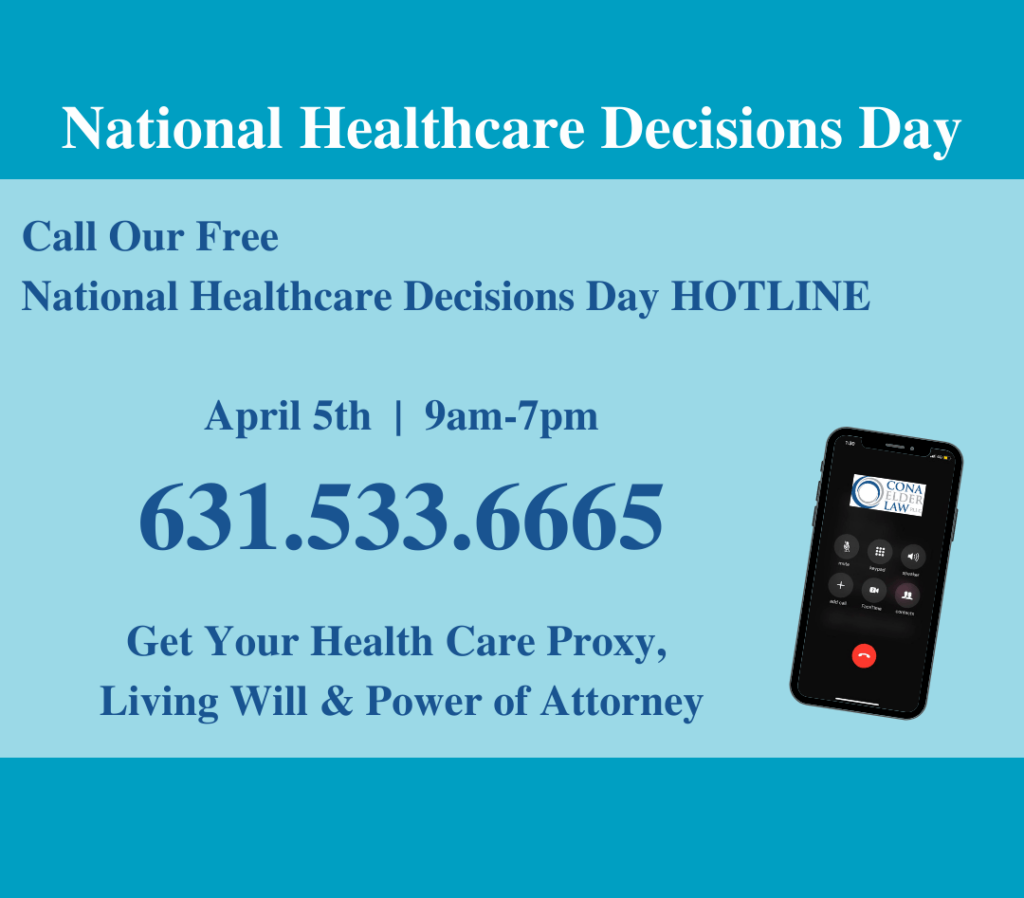
National Healthcare Decisions Day
April 16th is National Healthcare Decisions Day, a day for all of us to take stock and ask ourselves: “Do I have Advance Directives: a Health Care Proxy, Living Will and Power of Attorney? Who will make health care decisions for me if I am unable to? What are my end-of-life wishes and have I documented them to be sure my wishes are honored?” Started in 2008, this National day seeks to bring awareness to the importance of advance directives and the significance of starting a conversation with our loved ones.
A person with capacity can communicate their wishes to medical professionals regarding their health care decisions, but what happens if you are unable to do so? A Health Care Proxy and Living Will permit individuals to engage in advance medical care planning and are critical in the event of temporary or permanent incapacity.
Take control of your health care! Call us at 631.390.5000 to speak with our experienced Long Island Elder Law attorneys and schedule a consultation now, or call Cona Elder Law’s FREE National Healthcare Decisions Day Hotline at 631.533.6665 on April 5th from 9am to 7pm.
National Healthcare Decisions Day is a day for all of us to take stock and ask ourselves:
- Do I have Advance Directives: Health Care Proxy, Living Will, Power of Attorney?
- Who will make my health care decisions if I am unable to?
- Does my family know my end of life wishes?
- If my family disagrees, how can I make sure that my wishes are followed?
A Health Care Proxy is used to designate a Health Care Agent to make medical decisions on your behalf and to communicate your health care wishes to medical professionals. A Health Care Agent is allowed to make decisions when your doctor has determined that you can no longer make those decisions yourself. You should appoint an alternate Health Care Agent should the first agent be unavailable or unable to act. Your Health Care Proxy should contain a HIPAA release authorizing your Health Care Agent to have access to your medical records. If an individual has capacity and can express their own health care decisions, the Health Care Agent cannot override those decisions.
A Living Will is a document in which you express your wishes regarding end-of-life care, including your wishes regarding the use of life-sustaining treatments such as artificial nutrition and hydration, pain management, and administration of CPR. The Living Will works together with the Health Care Proxy and the appointed agent must be the same in both documents. You make your own medical care decisions in your Living Will; your Health Care Agent simply sees to it that your wishes are carried out by their authority under the Health Care Proxy.
TIPS TO KEEP IN MIND: Start the healthcare decisions conversation at the kitchen table, not the intensive care unit. By making these choices yourself, you relieve your family members from the burden of making the difficult decisions for you when the time comes, or worse, arguing about what you would have wanted. Having Advance Directives makes your wishes clear and puts a plan in place.
About the Author Cona Elder Law
Related Posts
The Aging Prison Population: A Nursing Home Dilemma
Jennifer Cona Breaks Down Elder Law as a Guest on the Donna Drake Show
On-the-Ball Older Adults: How to Travel Smart This Summer
Medical Aid in Dying Act Gains Momentum But Legislature Fails to Act
Melissa Negrin-Wiener on the Radio Show Island Outlook with John Lynch
Melissa Negrin-Weiner on Things You Should Leave Out of Your Will

